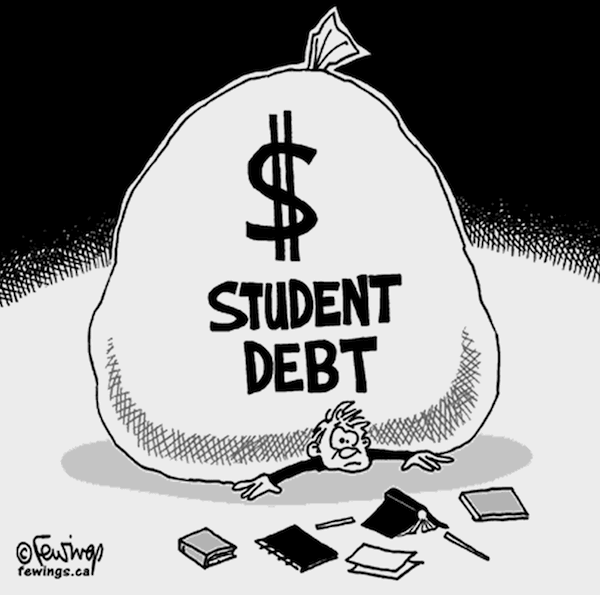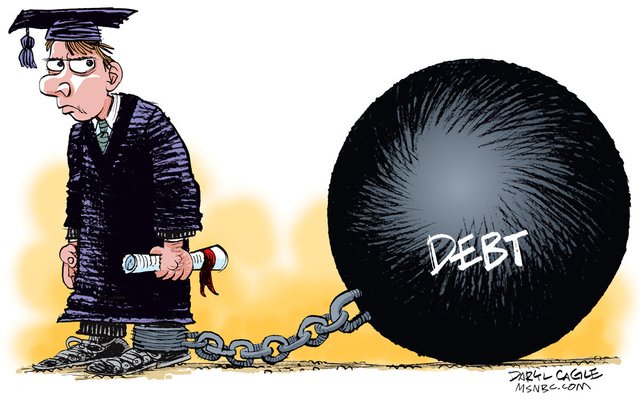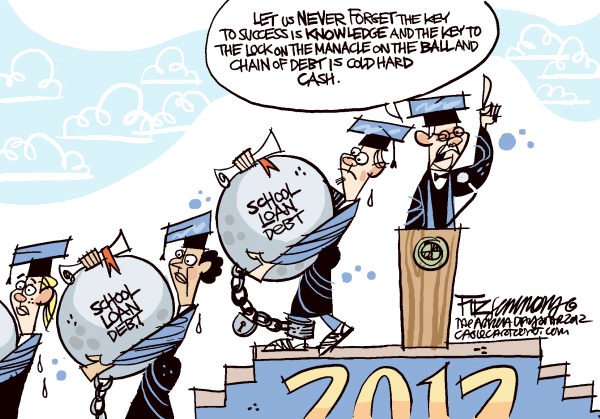Student Debt and Access to Higher Education

Here I present some evidence whether there is a relationship between fear of indebtedness and the socio-economic level of the prospective students’ families; whether there is an association between fear of indebtedness and students’ performance; whether there is a link between fear of indebtedness and the type of post-secondary courses that students study.
Throughout this review, "fear of indebtedness’ has been understood to refer to the perception of young people and their families that the decision to go on to Higher Education will entail assuming a level of indebtedness that would be difficult or nearly impossible to manage in the future.
The Status of the Debate

Higher education policies have considered increasing the availability of loans so that the different socio-economic strata can have a more equal access to Higher Education.
In this context, Carneiro and Heckman (2002) have analyzed the relationship between family income and access to Higher Education, focusing on short-term loan restrictions and long-term factors that permit the development of cognitive and non-cognitive skills. They argue that long-term factors which foster the previously mentioned skills are the principal determinant in the relationship between family income and access to Higher Education, as “Children from families with higher incomes have access to resources that children from families with lower incomes do not have” (p. 708). Still, they also remark that credit restrictions do not affect the decision to enter into Higher Education, given that these restrictions are overcome by Higher Education students by their becoming involved in paid work (p. 731).
The results reported by Carneiro and Heckman, show that a policy giving universal access to student loans for Higher Education does not necessarily imply an increase in access for those from disadvantaged sectors. Those authors provided with significant and interesting evidence with respect to the availability of loans, but a matter of utmost importance in this discussion is the predisposition that different income levels have to become indebted in order to study.
Are you willing to be indebted for the rest of your life or for a long period to attain a college degree?

The effect that fear of indebtedness has on access to Higher Education has been analyzed in Great Britain by Claire Callender (2002; 2003; 2005; 2008; 2017) focusing on the progressiveness of the system and on whether it facilitated access, particularly amongst the more disadvantaged sectors. Callender’s findings indicate that young people from lower income backgrounds have a greater aversion to indebtedness and that they are far more likely to decide not to continue their studies on to Higher Education for fear of indebtedness.

Those studies also showed that students who were poor before entering Higher Education and those from disadvantaged homes were the ones that accumulated the most debt.

Studies carried out in the United States show that be a student from a low-income home is associated with a lower likelihood of completing their studies, and that those who complete them are less likely to have good academic performance and to find a job after graduation (Mumper and Vander Ark 1991). In parallel with the above, research by Elias and others (1999) about the United Kingdom concluded that students belonging to the poorest quintiles earn on average 7% less than those graduates coming from the richest quintiles. This evidence shows that those coming from families with lower incomes will take longer periods to pay their student debt.

Research into salary differences among professionals from different socio-economic backgrounds in Chile shows that those who attended a fee-paying private school earn over 14% more than those from a subsidized school, and that the salary difference of these with those from public schools is 1.6% (Elfernan et al 2009); and again the evidence show that socio-economic background is an important factor in determining income in the labour market (Núñez and Gutiérrez, 2004).

In a complementary way, the study undertaken by the Committee of Vice-Chancellors and Principals of the United Kingdom in 1999 found that the majority of prospective students from lower income sectors opted for shorter programmes of study in response to the cost of Higher Education, which means, according to Callender, that those students most adverse to indebtedness often opt for financial security, thus sacrificing the development of greater human and cultural capital. This is why they register in less prestigious or less advanced centers, with shorter programmes of study, geared towards lower status jobs and close to their homes. And finally earning less than those who attend college!

Conversely to the findings for developed countries like Great Britain and USA, in Chile the study of Olavarria and Allende (2013) shows that students coming from lower-income sectors have a favorable disposition to take on debt (in form of loans) to pursue Higher Education studies, recognizing that this is practically the only way to study or to access Higher Education. Contradictory situation because the evidence show that students from lower income homes obtain jobs with lower salaries, even when compared with students with the same degrees from other socio-economic sectors.

With this evidence in mind loans could be associated with improving access to Higher Education of students from lower income groups, mainly because their greater willingness to pay hoping for greater future labour income. But this comes with a little trap, they generate an indebtedness which is difficult to deal with, since the labour market confines them to lesser-paid jobs (than their colleagues from middle-income and better backgrounds) or which generates a burden that affects their family well-being at the time when people usually start a home and make long-lasting life investments.

In the last years the student movements in Chile have managed to change a little bit the situation about the indebtedness of the future students achieving tuition-free university education for the 50% Chile’s poorest students. But the implementation of that policy and the possibility (or maybe impossibility) of implementing a free for all education (as the movements wanted) put in serious burden the actual administration. (for an analysis and critics to this policy look at https://doi.org/10.6017/ihe.2016.86.9372 )
What do you think about student debt ?
Share your experiences!
Resteem and Follow me at @ciag
References
Callender, C., and Mason, G. (2017). Does student loan debt deter higher education participation? New evidence from England. Annals of American Political and Social Science.
Callender, C. and Jackson, J (2008) 'Does Fear of Debt Constrain Choice of University and subject of study?' Studies in Higher Education Vol 33 No 4, 405-429
Callender, C. and Jackson, J (2005)'Does Fear of Debt Deter Students from Higher Education?' Journal of Social Policy Vol 34/4 pp 509-540
Callender, C. (2003): «Attitudes to Debt: School Leavers’ and Further Education Students’ Attitudes to Debt and their Impact on Participation in Higher Education», Londres: Universities UK.
Callender, C. (2002): «The Cost of Widening Par- ticipation: Contradictions in New Labour’s Stu- dent Policies», Social Policy and Society 1: 83-94.
Carneiro, P. & Heckman J. (2002): «The Evidence on Credit Constraints in Post-secondary Schooling», The Economic Journal, 12: 705-734.
Mumper, Michael and Pamela Vander Ark (1991): «Evaluating the Stafford Student Loan Program: current Problems and Prospects for Reform», Journal of Higher Education, 62 (1): 62-78.
Elias, Peter, Abigail McKnight, Claire Simm, Kate Pur- cell and Jane Pitcher (1999): «Moving on: Graduate Careers three Years after Graduation», Manchester: CSU, DfEE.
Elfernan, R., Soto, C., Coble, D. & Ramos, J. (2009): «Determinantes de los salarios por carrera», working paper wp300, University of Chile, Department of Economics.
Núñez, J. and Gutiérrez, R. (2004): «Classism, Discrimination and Meritocracy in the Labor Market: the Case of Chile», working paper wp208, University of Chile, Department of Economics.
The previous research was adapted from a paper called “Student Debt and Access to Higher Education in Chile” (doi:10.5477/cis/reis.141.91) writen with Mauricio Olavarria (https://www.researchgate.net/profile/Mauricio_Olavarria-Gambi)
Resteem and Follow me at @ciag
Spanish version of this post
https://steemit.com/spanish/@ciag/endeudamiento-estudiantil-y-acceso-a-la-educacion-superior
it's such a scam really, in highschool toward the last few months before graduation they have people coming in basically telling all the kids if they don't go to college they will fail in life and work at fastfood for all of eternity, and tell them if they do go to college they will make $100,000+ per year almost guaranteed, but that's not even remotely true they just want you to take out the loans so you'll be stuck paying the absurd amount of interest they have on them for the rest of your life
as you say thats the awful true... they will never tell you the true they only want to make more money. Maybe it's true that you could earn more money if you go to college but at expense of what... and if you talk about free tuition, quality education or things like that you are not very welcome...
Debt is the way we learn to deal with anxiety over the problems of today. Ironic, isn't it?
Universities are a trillion dollar business in the USA. What would happen to that business model if they did not keep new blood coming in. Yes some fields need education. But you could cut it down if you just had to take classes on your field and not other electives.
In the USA, skill sets are secondary. You need a degree, a piece of paper, to be employable. At least, if you work for someone else.
As for debt, there are ways around it, if you plan and save effectively. I'm currently working towards a masters degree... and getting paid to! I took a graduate assistant position. As compensation for the work, tuition is waived and I'm given a living cost stipend.
Undergraduates can do work study programa, as well as pursue grants and scholarships.
First as you say the degree or that piece of paper i think is getting generalized around the world... which in many situations is not a good thing... i know a lot or "professionals" from universities where they literally buy a diploma.
I know if you are someone with saving habits you can accomplish almost anything... but there's a lot of reasons why people couldn't save money low wages, vulnerable situations, kids at home, etc... if you like that issues i recommend to read things related to "poverty traps" is something like a vicious circle...
As you said its possible to work while you study.. but not always... maybe in masters and Pdhs ... i do the same for my master degree, so i know is possible.
But what about undergraduate students... remember that as an undergraduate the jobs you are able to apply are always low skille, low wages and extensive workdays so study i a lot of situations is merely impossible. Remember that you need money for the bus, lunch, books, etc.... I think all those points apply to any country.
Finally... as you say for undergraduates exist grants and scholarships but that depends on the country... and as you know its impossible to give scholarships to everyone... so always you have people staying below the train, thats i think is not good.
You seem to be under the impression that I'm disagreeing with your post. That's not the case.
I'm not saying it's easy, only that it is possible. In the USA, there are grants and scholarships. They're not always handed to you on a piece of paper, though. Some require a lot of work to find. Personally, I worked every summer at a low-wage job and did work study making $5/hr during the school year. Work study is tax free and the lab monitor positions allow you to get work done, if it's slow. Federal pell grants covered a significant chunk back then, too. I graduated with debt, but not much.
I know others, though, who thought they needed to go fancy schools and graduated with mountains of debt.
People in the US also seem to think that they should go straight from high school into a four-year school. Don't. Work a "job" for a few years and save up first. Go to a community college for general credits and transfer to a four-year school or, better yet, get a liberal arts degree from a community college and then find a position related to what you want to do for a career. That way, you can build experience. If you decide to go for a higher degree, your employer may even foot the bill.
As for other countries, it really depends on which one you're in. My friends in Spain pay a fraction of what we do in the USA.
Yes, inequality is a thing. Unfortunately, it can be very limiting. It shouldn't become an excuse, though. If you're really driven, there is a way.
The real question is: is there a why? My undergraduate degree was worthless—couldn't get work because of lack of "experience." Since then, I've worked in different places for about ten years and am now going back for a masters. I hope it's more use than the bachelors was.
If you absolutely need a degree, you can do it. If you don't need one, it's not worth the effort and cost.
I might add that I believe some things should be socialized. Health care and access to education should be available to all. Unfortunately, these aren't likely to happen in my country in the near future, let alone on a global scale.
Sorry if i gave you that impression... i know for your last post that you dont disagree with this post dont worry... i was giving you some extra info about the rest of the world. 😁 😁
As you say maybe the problem with over indebtedness is that people think that they need to get as quick as possible that piece of paper, without thinking that there's other way around to obtain the same.
If all people could think that access to certain things like health care, social assistant and education ...i'm sure that the world could be a better place to live... but as @bigram13 said... education like a lot other things are a trillion dollar business and that its very unlike to change in any time soon.